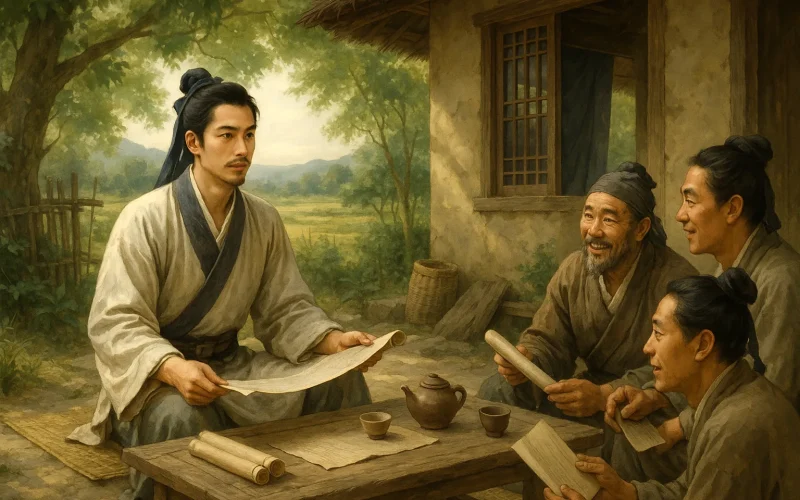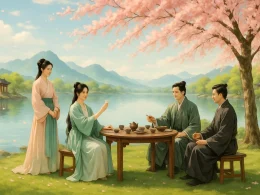In Southern Village I would dwell,
Not that the house there augurs well,
But people live in simple ways,
With whom I'm glad to pass my days.
For years I've cherished this ideal;
Today it becomes true and real.
Why should I need a spacious flat
But room enough for bed and mat?
My neighbors may call now or then,
And talk of olden days and men.
We'll read good writings we enjoy
And solve the questions which annoy.
Original Poem
「移居 · 其一」
陶渊明
昔欲居南村,非为卜其宅。
闻多素心人,乐与数晨夕。
怀此颇有年,今日从兹役。
弊庐何必广,取足蔽床席。
邻曲时时来,抗言谈在昔。
奇文共欣赏,疑义相与析。
Interpretation
This first poem of "Relocation" was composed in autumn 410 AD when Tao Yuanming was 46. Two years prior, his residence in Shangjing (modern Jiujiang, Jiangxi) had burned down, forcing him to move. His subsequent relocation to "Southern Village" at the foot of Mount Lu realized his long-cherished reclusive ideal. Written after settling into his new home, the poem expresses his inner tranquility, contentment, and steadfast pursuit of pastoral simplicity—while subtly conveying his detachment from corrupt officialdom through his celebration of rustic authenticity.
First Couplet: "昔欲居南村,非为卜其宅。"
Xī yù jū nán cūn, fēi wéi bǔ qí zhái.
"Long have I wished to dwell in Southern Village— / Not for geomancy's auspicious tillage."
The temporal marker "long" (昔) establishes this as a fulfilled dream, while rejecting feng shui motives underscores spiritual rather than material priorities.
Second Couplet: "闻多素心人,乐与数晨夕。"
Wén duō sù xīn rén, lè yǔ shǔ chén xī.
"Knowing many simple-hearted neighbors there, / To share dawns and dusks—my purest care."
"Simple-hearted" (素心人) defines Tao's ideal community—those uncorrupted by worldly pretensions, valuing shared time over social status.
Third Couplet: "怀此颇有年,今日从兹役。"
Huái cǐ pō yǒu nián, jīn rì cóng zī yì.
"This wish I've nurtured many a year; / Today this 'burden' I gladly bear."
The ironic "burden" (役) describes his relocation with quiet joy, transforming hardship into willing pilgrimage toward authenticity.
Fourth Couplet: "弊庐何必广,取足蔽床席。"
Bì lú hé bì guǎng, qǔ zú bì chuáng xí.
"Why need my thatched hut be spacious? / Enough to shelter mat and pillow gracious."
This minimalist credo—where a roof over basic bedding suffices—epitomizes Tao's philosophy of sufficiency beyond material accumulation.
Fifth Couplet: "邻曲时时来,抗言谈在昔。"
Lín qǔ shí shí lái, kàng yán tán zài xī.
"Neighbors visit often, free and frank, / Speaking their minds—no hollow rank."
"Free and frank" (抗言) interactions depict egalitarian community untouched by social hierarchies or pretenses.
Sixth Couplet: "奇文共欣赏,疑义相与析。"
Qí wén gòng xīn shǎng, yí yì xiāng yǔ xī.
"Rare texts we savor side by side; / Perplexing meanings we divide."
The celebrated closing couplet crystallizes intellectual communion—collective appreciation of literature and collaborative truth-seeking as life's highest pleasures.
Holistic Appreciation
The poem moves from aspiration to realization with unadorned elegance. Tao constructs an anti-materialist utopia where "simple-hearted" neighbors, modest dwellings, and unfettered intellectual exchange replace worldly success metrics. Beyond physical retreat, this represents spiritual homecoming—a conscious repudiation of bureaucratic corruption through radical simplicity and authentic human connection.
Artistic Merits
The poem's language is unadorned and natural, devoid of ornate rhetoric, yet it progresses layer by layer to profound artistic conception. Its emotions are understated yet genuine, structurally developing from aspiration to reality—moving from dwelling environment to neighborly interactions with deliberate depth. Through carefully chosen images like "simple-hearted neighbors," "humble cottage," and "rare texts," it constructs an idealized vision of reclusive life. The tranquil, leisurely tone belies an unwavering commitment to noble ideals, exemplifying the "lotus rising unadorned from clear water" beauty characteristic of Tao Yuanming's poetry. Particularly the closing lines' "shared appreciation" and "collaborative analysis" crystallize the intellectual camaraderie idealized by scholars—a cultural ambiance that remains captivating to this day.
Insights
Tao's relocation manifesto challenges modern notions of success by measuring wealth in neighborly bonds and intellectual exchange rather than square footage or social status. His "thatched hut" philosophy suggests true freedom comes from disentangling self-worth from material accumulation—a timely antidote to consumerist culture. The poem ultimately advocates for life organized around meaningful connection rather than external validation.
Poem translator
Xu Yuanchong (许渊冲)
About the poet

Tao Yuanming(陶渊明), 365 – 427 CE, was a poet, literary figure, fu writer, and essayist active during the late Eastern Jin and early Liu Song dynasties. Born in Chaisang (near present-day Jiujiang, Jiangxi Province), he pioneered a new genre of pastoral-themed literature, expressing profound philosophical insights through simple language. His poetic style became an enduring aesthetic standard in classical Chinese poetry.











